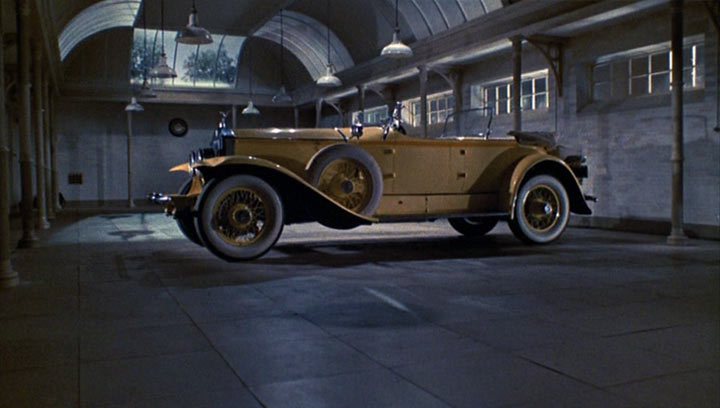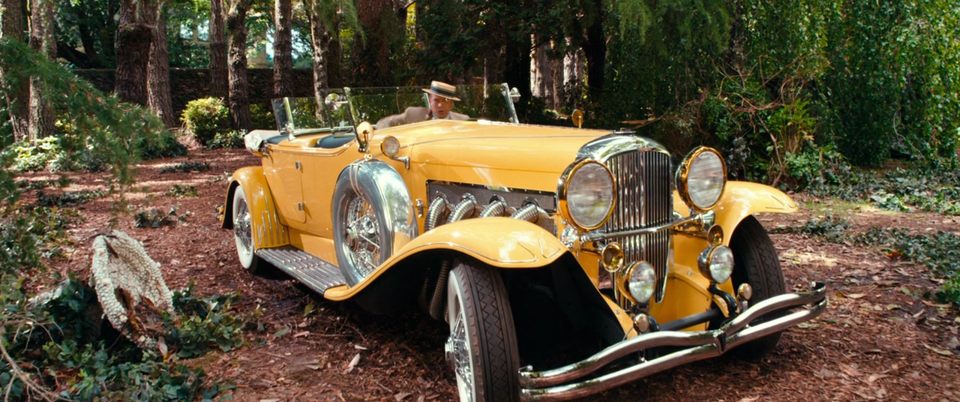
It's almost the end of 2022. That means Jay Gatsby lived and died 100 years ago within F. Scott Fitzgerald's The Great Gatsby. I first read the roaring twenties classic in high school, right before the 2013 film with Leonardo DiCaprio came out. It was one of the only reading assignments that my friend group really enjoyed. It was fun having the film trailers to help visualize what we were reading. As class car enthusiast, one of the attractions of the story was the time period and, more specifically, its cars.
The characters drive a variety of classics from the late teens and early twenties. Gatsby's car plays an important role in the plot (which I won't spoil but come on, it's been around longer than you or I have). I find this car's description and its recreation in film over the years to be wildly different and fascinating. So let's take a closer look at Gatsby's ride.
This is what Fitzgerald has to say about Gatsby's car through Nick:
I'd seen it. Everybody had seen it. It was a rich cream color, bright with nickel, swollen here and there in its monstrous length with triumphant hatboxes and supper-boxes and tool-boxes, and terraced with a labyrinth of windshields that mirrored a dozen suns. Sitting down behind many layers of glass in a sort of green leather conservatory we started to town.
What an awesome description. And it's exactly what you'd expect from cars of the rich and famous from the early to mid twenties: nickel plating, multiple windshields or even cowls, probably open-air, and lots of accessory boxes. This is the first time the car is mentioned and the only time it's described as "cream-colored." The rest of the small snippets throughout describe it as a topless car with yellow paint and green leather upholstery.
‘Shall we all go in my car?’ suggested Gatsby. He felt the hot, green leather of the seat. ‘I ought to have left it in the shade...’
'It was a yellow car,' he said, 'big yellow car. New... No, but the car passed me down the road, going faster'n forty. Going fifty, sixty.'
There's not much more to go on except the color is repeated a few more times. And it's fast, considering your typical Model T Ford topped out at about 40-45 MPH. We also get a brief description of two of Gatsby's cars, one of which has a specific make and model.
On week-ends his Rolls-Royce became an omnibus, bearing parties to and from the city, between nine in the morning and long past midnight, while his sta- tion wagon scampered like a brisk yellow bug to meet all trains.
It's not surprising that a millionaire bootlegger like Gatsby has more than one car. The first is a Rolls-Royce, the typecast rich man's car. The other, a station wagon, is literally used as a depot shuttle for party guests. We can safely assume that the station wagon is not Gatsby's personal car being used to shuttle guests around, even though it's also colored yellow. If these are the only two cars Gatsby owns, then the Rolls must be the cream-colored "circus wagon", although more likely than not Gatsby has more than just a couple of cars in his garage.
Assuming it is a new model, top-of-the-line Rolls-Royce, Gatsby was most likely driving around in a yellow Rolls-Royce 40/50 "Silver Ghost", produced from late 1906 to 1926. Starting in 1908 it was the only model produced by Rolls during this time until the introduction of the smaller, cheaper 22 in 1922. The engine and chassis remained mostly unchanged but the body style varied somewhat as years went by, becoming sleeker and more streamlined.

Coincidentally, by 1922 the 40/50 sales were languishing compared to newer, faster automobiles being produced by Rolls' competitors. The description of the car certainly fits however, with the nickel-plated grill and accessories, dual-cowl touring bodies, and leather upholstery.
Fast-forward to the early 1970s and film producers are sourcing props and vehicles for The Great Gatsby (1974), this time starring Robert Redford. They selected and repainted a slightly newer model Rolls, the first Phantom. While it wasn't a period correct choice, I certainly think the Phantom was a better looking Rolls than the Silver Ghost.
The Phantom was produced not just in England but also in Springfield, MA. A new overhead valve engine was offered along with a three speed transmission and a central lubrication system for U.S. customers.

A silent film was produced for Fitzgerald's book in 1926 but no known copies of it exist. The earliest watchable adaptation was released in 1946. Gatsby (Alan Ladd) was driving around in a supercharged Model J Duesenberg.

The choice of a Duesenberg Model J was and continues to be an interesting one. For one, the Model J wasn't produced until 1928. All chassis were produced between 1928 and 1929 and then bodied and sold throughout the early 1930s during the Depression. The Duesenberg chassis were powered by straight eights with dual overhead camshafts and four valves per cylinder. They were putting out over 250 horsepower and capable of speeds of over 90 MPH. Later on in the 1930s they would also be available supercharged.
If you're concerned about historical accuracy, there's zero chance of Gatsby driving a Model J in 1922. Heck, the novel itself was published in 1926, two years prior to production. Couple that with the specific mention of Rolls-Royce by name in the text, and it's a hard sell. If you're less concerned like me, however, this is a much more appropriate car for Gatsby to drive. First of all, we're in a world of fiction. There's probably no such thing as T.J. Eckelberg or Wilson's Garage in 1922 New York, so it sits fine with me that Gatsby would drive something that looks and sounds like a Dusey. Second of all, it makes sense for his character.

The 2013 Baz Luhrmann film utilizes a replica supercharged Duesenberg which gets a surprising amount of screen time. This movie actually sold the idea of Gatsby driving a Duesenberg as character building. Gatsby is new money, as opposed to Tom Buchanan's old money. Gatsby's non-traditional, no matter how hard he tries to present himself as such. He's a bootlegger living in a castle-like mansion with rowdy parties. He wears gold, silver, and pink suits. He wants to present as wealthy, but he doesn't have generations of wealth and prestige backing it up. So he emanates wealth like a young playboy millionaire. And what did young playboy millionaires drive in the twenties and thirties? They didn't drive the stuffy, English-built Rolls-Royces their fathers drove, with horsepower quickly being surpassed by much more pedestrian vehicles. They drove Duesenbergs. The most expensive, fastest cars in America.
Big, high-tech, with luxurious, even gaudy coach-built bodies. That's the kind of car Gatsby should drive. And that's why I like seeing even a replica on screen.